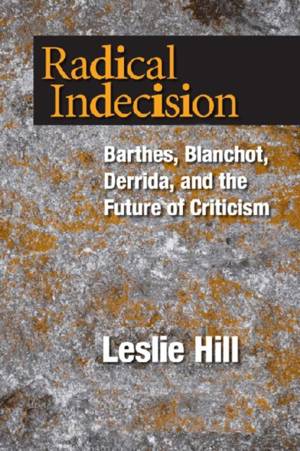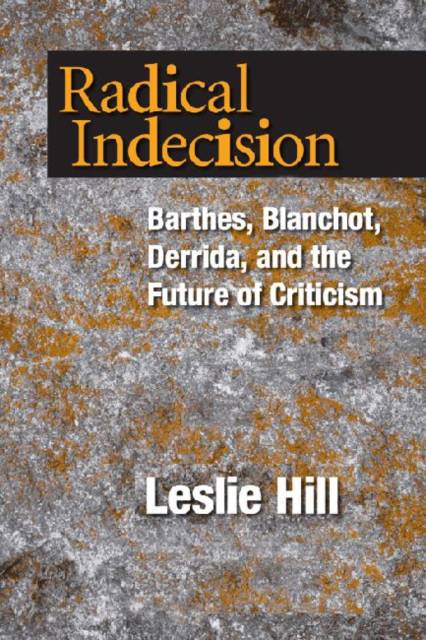
- Retrait gratuit dans votre magasin Club
- 7.000.000 titres dans notre catalogue
- Payer en toute sécurité
- Toujours un magasin près de chez vous
- Retrait gratuit dans votre magasin Club
- 7.000.0000 titres dans notre catalogue
- Payer en toute sécurité
- Toujours un magasin près de chez vous
Radical Indecision
Barthes, Blanchot, Derrida, and the Future of Criticism
Leslie HillDescription
In his newest book, Radical Indecision, esteemed scholar Leslie Hill poses the following question: If the task of a literary critic is to make decisions about the value of a literary work or the values embodied in it, decisions in turn based on some inherited or established values, what happens when that piece of literature fails to subscribe to the established values? Put another way, how should literary criticism respond to the paradox that in order to make critical judgments of literary works, it is first necessary to suspend judgment and to consider the impossibility of making a final decision? Hill pursues these ideas in the works of leading French critics Roland Barthes, Maurice Blanchot, and Jacques Derrida, discussing writers such as Sade, Mallarmé, Proust, Artaud, Genet, Celan, and Duras.
Hill concludes that, despite their differences, Barthes, Blanchot, and Derrida share a conviction that criticism cannot take place without exposure to that resistance to decision that is inseparable from reading and that they address diversely as the "neuter" or the "undecidable." Radical Indecision offers the first sustained exploration of the "undecidable." This comprehensive book breathes new life into the discipline of literary theory and will be essential reading for students and scholars alike.
Spécifications
Parties prenantes
- Auteur(s) :
- Editeur:
Contenu
- Nombre de pages :
- 454
- Langue:
- Anglais
Caractéristiques
- EAN:
- 9780268031077
- Date de parution :
- 15-01-10
- Format:
- Livre broché
- Format numérique:
- Trade paperback (VS)
- Dimensions :
- 152 mm x 226 mm
- Poids :
- 612 g

Les avis
Nous publions uniquement les avis qui respectent les conditions requises. Consultez nos conditions pour les avis.






